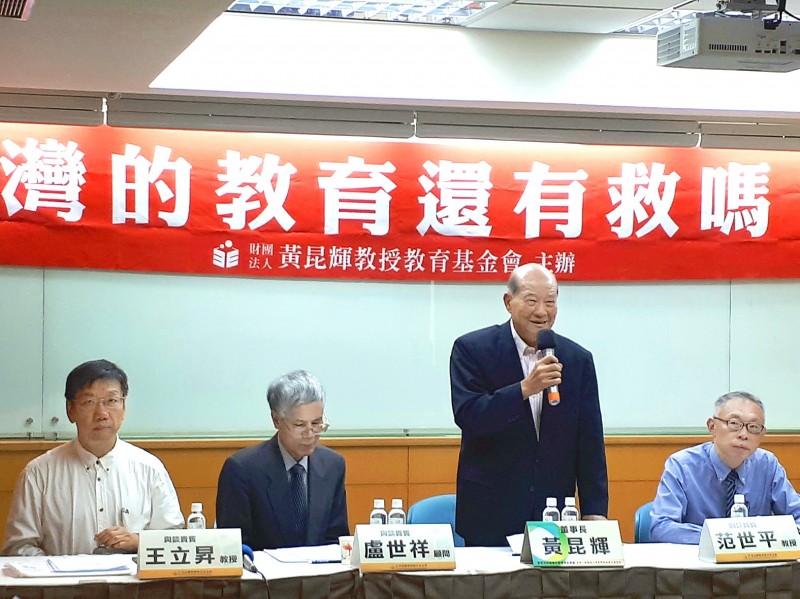《TAIPEI TIMES》 Government urged to address educational deficiencies

Former Taiwan Solidarity Union chairman Huang Kun-huei, standing, speaks during a Taipei seminar held by the Professor Huang Kun-huei Education Foundation on the future of education in Taiwan, as, from left, Alliance for Education Action president Wang Li-sheng, media veteran Lu Shih-hsiang and National Taiwan Normal University political scientist Fan Shih-ping listen. Photo: CNA
By Wu Po-hsuan and Sherry Hsiao / Staff reporter, with staff writer and CNA
Social stratification, “mediocre quality” and an “imbalance of talent cultivation” in the education system are risking the nation’s competitiveness, the Professor Huang Kun-huei Education Foundation said yesterday.
If these three issues, which were highlighted by a research team at the foundation, are not addressed, the overall competitiveness of the nation could drop, former Taiwan Solidarity Union chairman Huang Kun-huei (黃昆輝), the foundation’s chairman, said at a discussion in Taipei titled “Can Taiwan’s education be saved?”
After education reform efforts began in the 1990s, many new universities were opened, but students who were “not cut out for academia” were able to attend university, leading to the “banalization of higher education,” Huang said.
Technical and vocational high schools focused on getting their students into college and ignored skills training, which resulted in a failure to produce qualified technicians, leading to a labor shortage in industry, he said.
When new universities first began opening, the public supported the idea, said Fan Shih-ping (范世平), a professor of political science at National Taiwan Normal University.
However, once the number of universities grew, schools tried to cater to students’ desires to attract prospective students, he said.
Schools created majors that students wanted, and so departments with majors that are “difficult,” such as physics and mechanical engineering, have shrunk, he said.
“Now everyone wants to be an Internet celebrity, so the numbers of fashion and performing arts majors have increased,” he added.
The majors that students find “easy” or “interesting” might only land them jobs in the service industry, with salaries of just NT$22,000 per month, while the Hsinchu Science Park suffers from a shortage of qualified technology applicants.
The “biggest problem” with Taiwan’s education system is this gap between talent supply and demand, so government needs to act as a regulator and integrate educational and industrial development, he said.
Education should bring out the potential of students, said media veteran Lu Shih-hsiang (盧世祥), an adviser to the Taipei Times .
With the preoccupation of getting into college, the imbalance in talent supply and demand is what has led to so-called “nomad teachers” — people who cannot find full-time positions — and other phenomenon in Taiwan, he said.
The proliferation of universities has also made diplomas depreciate the way that currencies do during times of inflation, Lu added.
The Executive Yuan should launch a cross-agency effort, create a talent management committee and help the National Development Council plan for overall domestic labor demand, Huang said.
新聞來源:TAIPEI TIMES


















